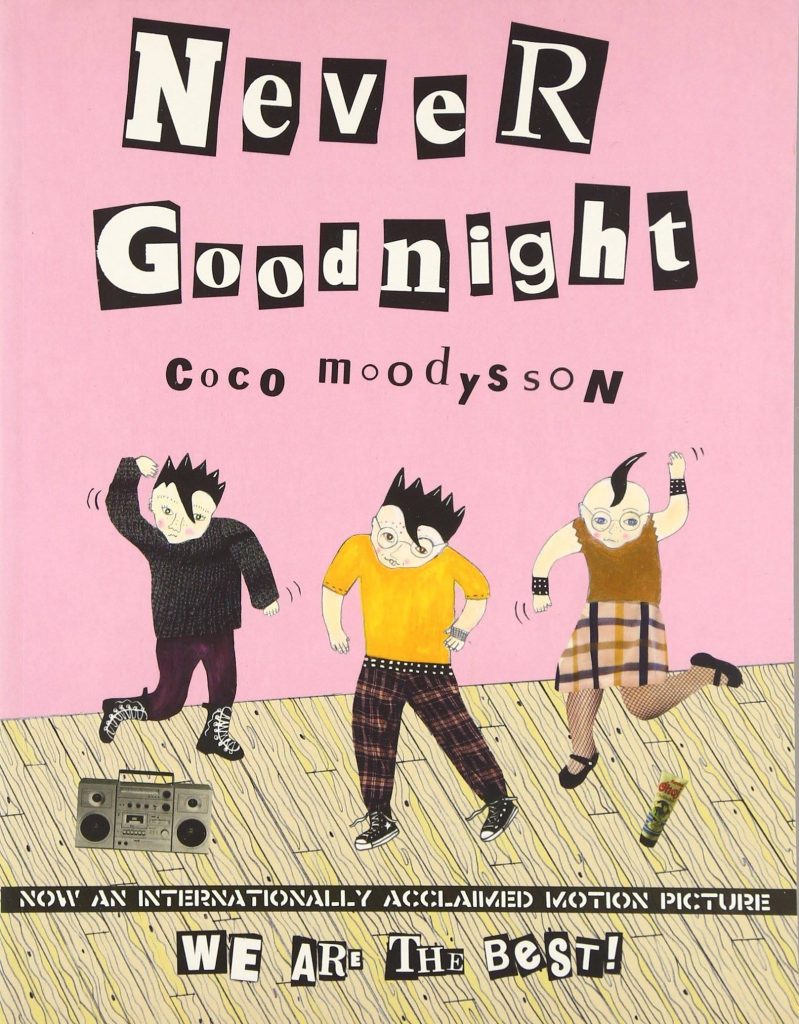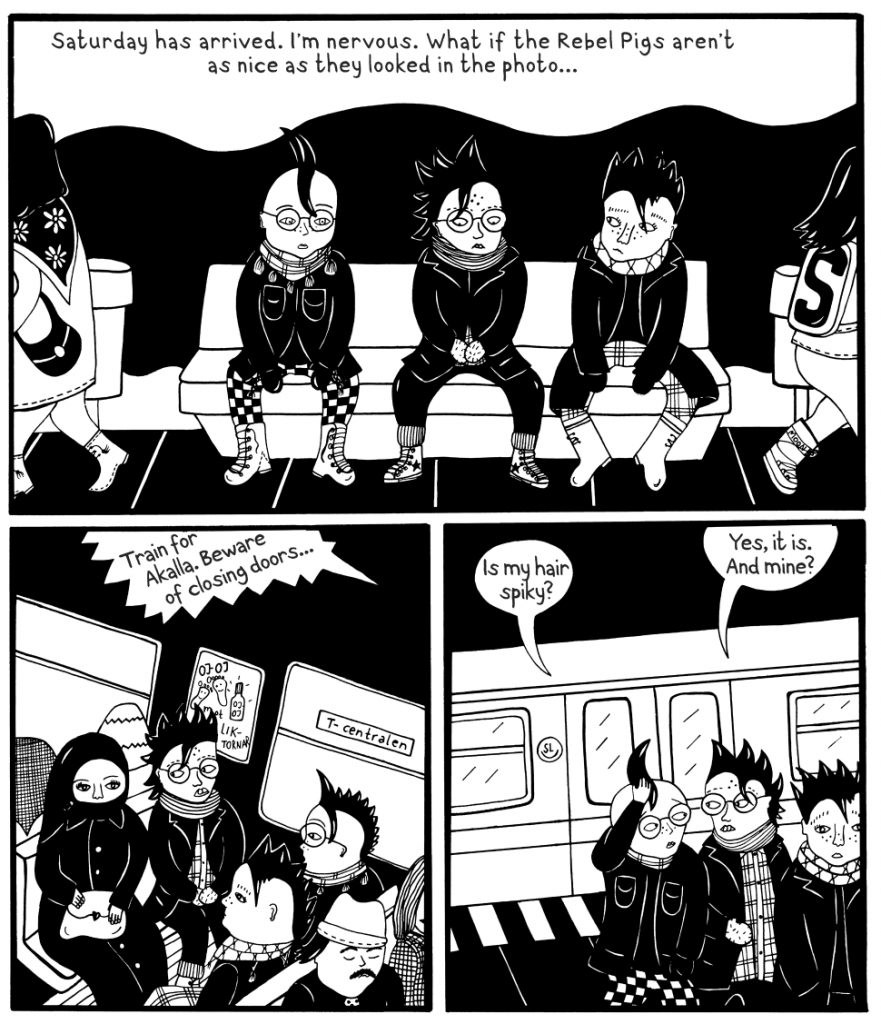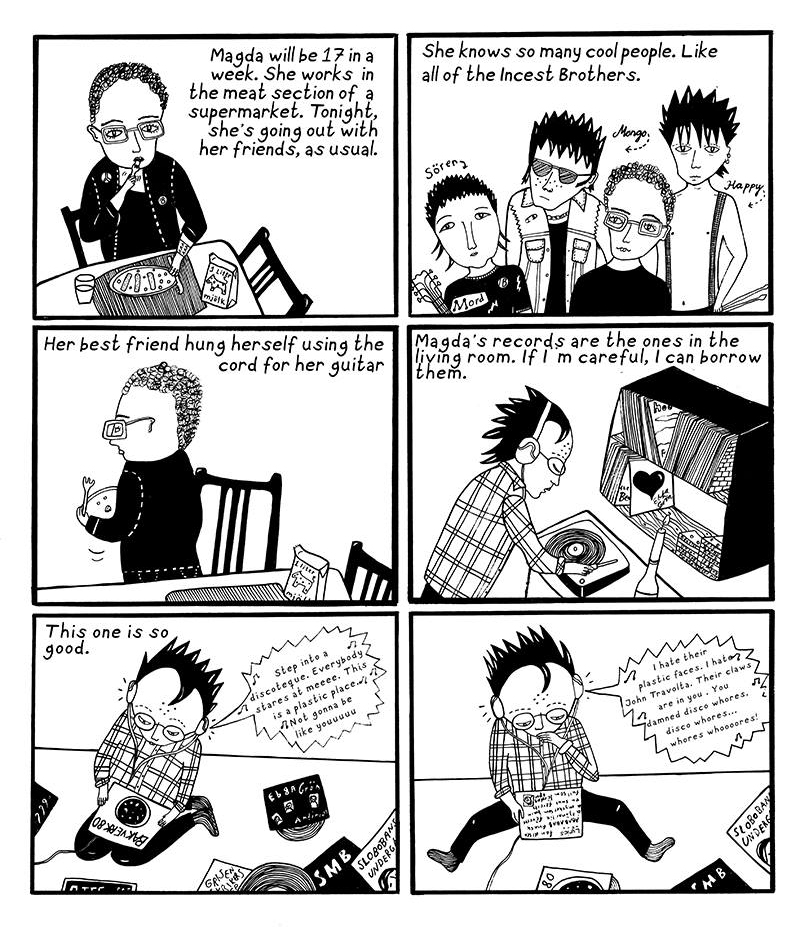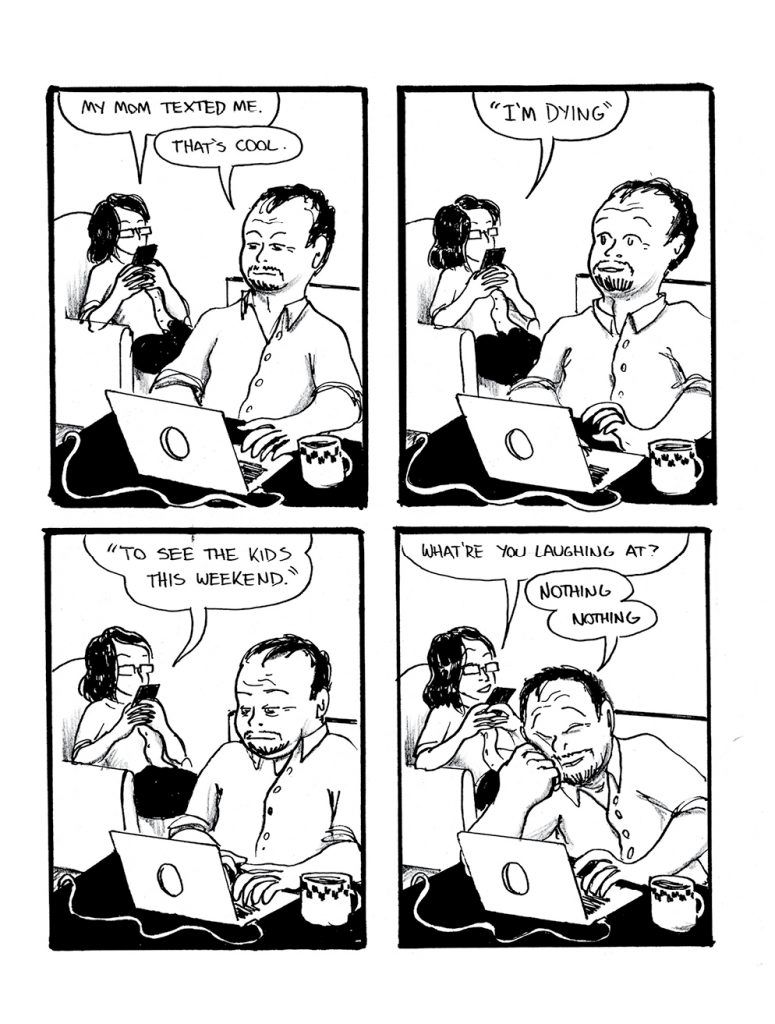Sam Ombiri on Coco Moodysson’s Never Goodnight – plus other news and comics!
—————————————————————————————————
Sam Ombiri here: I’ve been reading a splendid comic called Never Goodnight by Coco Moodysson. I found out about this fantastic book through Coco’s husband, Lukas Moodysson. Lukas Moodysson is my favorite living movie director as it stands right now. His movies have received praise from Ingmar Bergman as well as Harmony Korine, and those two directors really speak to the sensibility of Lukas. Those are two filmmakers he admires, and from my understanding this admiration was independent of the praise he receives from those two directors. He made a great adaptation of Coco’s Never Goodnight entitled We Are The Best.
I just don’t know where to start with this book. This comic is one of the most fun autobio comics I’ve ever read. The drawings are spectacular, it’s great that she was able to summon enough of this creative energy for every panel, and deliver consistently. Her drawings are like candy that don’t lose their sweetness when eaten too much. The drawings are simultaneously so expressive, but all done with that line that Sammy Harkham always talks about, where every drawing has the same weight to it and it doesn’t deviate.
It’s easy to see why this book has the cult following it has. The storytelling is so clear, and I can see that the whole was considered, as opposed to some parts. The jokes in this book are really funny. The jokes don’t even seem like jokes, or funny observations made by a distant person reminiscing. Which is not to say that there’d be anything wrong if that, were it the case – in fact it’s commonly the case with autobio, or even non-autobio work (although people say all work is ultimately autobio). I guess this just speaks to the nature of life, but it’s really interesting how Coco’s comics don’t have that reminiscing attitude, despite that being what she’s doing throughout the whole work(reminiscing I mean).
It’s a really curious thing that when I read the comic it just feels like I’m watching life unfolding, and all the fun moments and funny moments unfolding with it. There is of course clear, concise timing in the way Coco leads us through the story, but I don’t feel the least bit, shall we say, “manipulated”. There are those moments in the book where it’s so cute I want to hurl, but I’m still completely sold. For example, where Coco talks about how she bought dog food and hid it under her pillow in case she ever got a dog, (this was after they went around begging for money to buy a guitar and instead just splurged on a bunch of snacks). I don’t know what to blame though: is it because Coco was such a likeable character to follow? Did I relate to it somehow? Are the drawings so charming that it’s disarming my suspicion?
It definitely seems earned because this specific brand of sentimentality doesn’t pop up until the 78th page, and the comic hasn’t demanded as much of an emotional response to be reciprocated to the work up until that point. It’s become the trend in some comics that the author just demand that the reader reciprocate an emotional response, just because they’re being courageous in expressing themselves in comics. I can’t speak for every case, but people making comics should realize that you can’t and shouldn’t blame the reader. If what you’re doing is independent of the reader, that’s a different story. You can’t just mumble some words and expect someone to read your mind and guess the rest of the sentence. You are responsible for making the sentence.
Part of what’s enjoyable (and at times it can be detrimental to me) is the ambiguity in experiencing and then re-experiencing work. This is with all art forms, though, and I really hesitate to say it’s especially so with comics because of how it’s words and images that you’re looking at. You’re also looking at the line work, you’re looking at the design. Makers should consider all this and perhaps accept this when making work and not let their vain guise of “how courageous they are for expressing themselves” be where the value of the work is derived. Coco’s book made me think of this because of how good it is. I didn’t feel cheated for reciprocating the emotional response Coco called for.
I feel that I should mention that it was surprisingly easy to separate the movie from the book whenever they would intersect. This goes deeper than them being different mediums, or what couldn’t be in the movie due to Lukas and Coco’s difference in sensibility. Even when I’m reading the exact same scene play out in the book that was in the movie, they seem so separate and this book is so distinguished that I don’t even think about the movie.
There’s an aspect to this book that I have no idea how to approach. I don’t know how comics are perceived in Sweden. It seems that there they have a tighter relationship with the literary world, maybe? I really don’t know. Anyway, there’s a panel in the book where Coco just coldly mentions how a friend’s friend killed himself with a guitar chord.
I’m rather puzzled at the intention of this. From what I understand, she was doing some work behind the scenes with Lukas’ films, and they made some kind of comic together (which someone should translate!) so I can’t help but to think there’s this lyrical element to her including this in the comic, something that’s similar to the lyricism in Lukas’ movies.
In contrast to this, though, there’s a sequence where the girls run out and there’s a homeless person with a syringe stuck in his arm, and he’s just there as a gag to convey how loud the girls are being about a bunch of nonsense, and yelling “We Are the Best!” It’s like he’s just there to be annoyed, but there’s a whole cute aspect to this. It’s funny because of how certain elements that were in the book were taken out of the movie, probably because of how it would evoke a completely different feeling, and completely change the atmosphere.
The sensibility of Never Goodnight feels a lot like a YA book, but introduces bleaker elements than those found in the adaptation made by Lukas (whom people sometimes liken to a more trustworthy incarnation of Lars Von Trier and who is associated with “the New Extremity” movement).
It’s just really funny how I don’t know what to make of this. Not that the comic is any less fun to read as a result, it only makes it more interesting to read. In a lot of ways, and obviously this comes as no surprise, there’s a lot of match up in terms of sensibility between Lukas and Coco. Maybe it’s because of how Lukas described his creative process as different from Coco’s that I anticipated a bigger difference. For example, Coco will say things like there’s not enough brown, or whichever color. This is strange because her comic are done in black and white! I feel that however many accolades I can try to give this book would be a futile attempt at describing how great this book is. It’s just such a wonderful book! – Sam Ombiri
—————————————————————————————————
Other News
- Ben Passmore animated – check it out HERE.
- Ron Wimberly on Radix Media, talking the sensual experience of paper, among other things – HERE.
- Philippe Leblanc reviews Carta Minor’s Passing for The Comics Beat.
- Zora Gilbert writes about Bingo Love by Tee Franklin, for Women Write About Comics – read the article HERE.
—————————————————————————————————

Collected from the thousands of pages of material that Frank has left scattered all over the digital landscape, these 4 PDF collections contain Frank’s best writing on comics and comics making from the past decade. Theory and process, reviews and discoveries, journeys both physical and spiritual.
Check out the “Best of Frank Santoro” PDF collections, available HERE!
—————————————————————————————————
Joanie and Jordie – 1-25-2018 – by Caleb Orecchio




